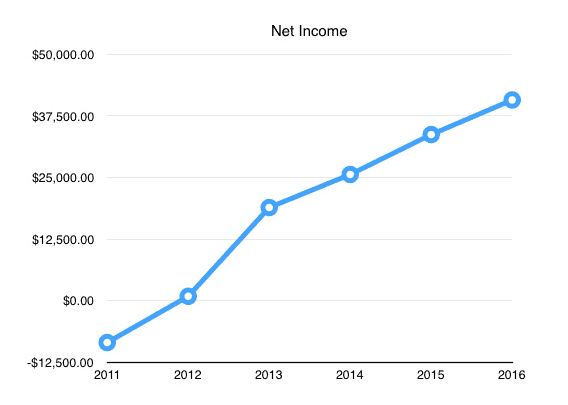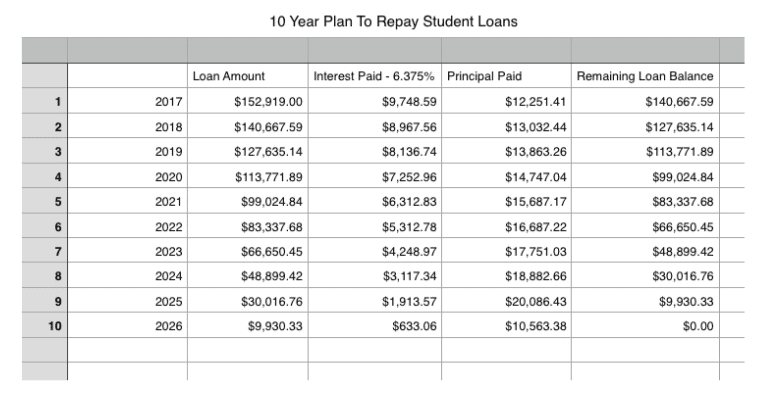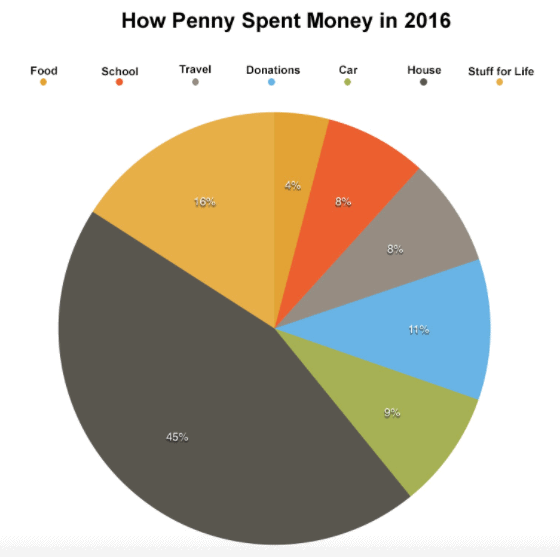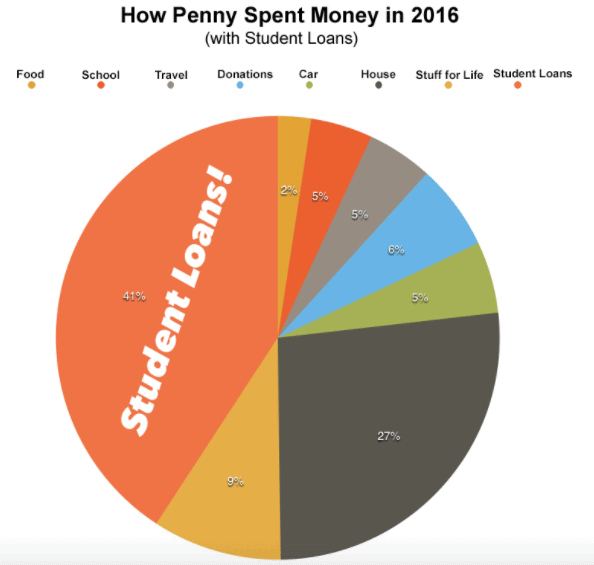 Today, I have an article from Penny. Her family of six spends just $53,000 a year, with $22,000 of that going towards their student loan debt. Here is her story.
Today, I have an article from Penny. Her family of six spends just $53,000 a year, with $22,000 of that going towards their student loan debt. Here is her story.
Dear Readers of Making Sense of Cents,
I’m Penny. I write a blog with my cousin, Rich. It’s called Penny and Rich. He’s rich. I’m poor. Get it? I’m a stay-at-home-mom with four kids. We have a household income of $43,000 a year and my husband and I have over $153,000 in student loan debt. Rich is a busy professional with a household income of $250,000 and he is well on his way to becoming a millionaire. This blog is our way of writing to and trying to understand each other, financially and otherwise.
We accumulated this massive student loan debt when my husband went back to school to become a chiropractor. He has been in practice almost six years now.
It’s doing better every year, but it’s taken a lot longer to grow a business than either of us thought it would.
We don’t regret taking out the loans, because we value having me staying home with the kids and family time over money and debt and everything. And, honestly, having the debt is not that big of a deal.
Rich doesn’t understand how my family of six can get by on such a small income, let alone tackle our massive student loan debt. But let me tell you, dear readers, how we are going to do it. Maybe you can make sense (that’s a shout-out to you, Michelle!) of our madness.
Related:

Our 10 Year Plan To Repay $153,000 in Student Loan Debt
Very simply, we are going to put $22,000 toward the debt every year. Here is a spreadsheet of what that is going to look like:

(Keep in mind that this spreadsheet is an estimate, because student loan interest is typically compounded daily, and I didn’t want to work through those sorts of calculations when creating the spreadsheet.)
$1,000 is taken out of our checking account automatically every month (for a total of $12,000 a year), plus an additional $10,000 will be thrown at it when we get our tax refund. This will eventually make a dent in that massive behemoth of a loan, and we will have it paid off entirely in 10 years.
Right now, it feels like we’re doing nothing more than throwing money at a wall. So much of it is going toward the interest. We have to pay $812 a month just to keep the loan from getting any bigger. Which sucks. At the end of the 10 years, we will have paid over $55,000 on the interest alone.
We’ve tried to refinance the loans, which is where all the really cool, fiscally responsible people are going, but they won’t have us given our debt to income ration (which, of course, makes sense on their end)…
But here’s another thing:
We are on a Income-Driven Repayment Plan with our lenders. This means that we make payments in accordance with our income. Right now, they are requiring us to pay:
$0
And they will forgive any loan balance remaining after 25 years.
Sounds like a pretty sweet deal, right?
So, why are we putting $22,000 a year toward student loans when we technically don’t have to pay anything and the remaining balance will be forgiven anyway?
Well, let me tell you, because here’s the catch: We would have to pay taxes on the amount forgiven!
So, let’s say we continue to remain at this income level ($43,000), or thereabouts, for the next 25 years, and let’s say we pay $0 the whole time. At the end of 25 years, due to the constant growth of that friggin’ interest, the loan will have amassed itself to an astounding:
$716,865
Thanks to this little handy Tax Calculator, I can calculate that we would have to pay $229,545 in taxes on that amount, which is actually $9,545 more than what we would pay doing my little 10 Year Repayment Plan thingy.
(Plus, we’re the ones who took out the loans, we’re responsible for paying them, and we really do want to be able to pay them back. Blah, blah, blah.)
So, now, a question you’re probably asking yourself is:
How in the world can you afford to put $22,000 toward student loans when you have an income of only $43,000 a year (and four kids to boot)?
First, let’s take a look at how we spent our money in 2016, and we’ll get into it:

Okay, so now you’re going to have some more questions here. And your first question is going to be:
How did you spend only $528 in food to feed your family of six?
Well, dear readers, here’s our deep, dark secret… since we are low income, we get the majority of our food covered by Food Support. I’ll write more about that at the end of this post, but, for now, there you have it. We get Food Support, and this enables us to put more of our money toward student loan loan debt.
Which will bring you to your next question:
Where are those student loan payments anyway?
For some reason, I like to keep them separate in my head (and therefore in this post). Since we are not *technically* required to pay them, I see it as a *somewhat* nonessential expense (although, really, it isn’t, I know this).
So, with the loan payments, our grand total of expenditures in 2016 was actually:
$31,942.03 in regular expenses
+$22,000.00 in student loans payments
$53,942.03 total
Which brings us to your next question:
But Penny, you’re only making $43,000 a year? How can you pay all that?
My second deep dark secret, dear readers, is… we get a massive tax refund every year.
Let’s look at these numbers:
$7,321 – 2015 Federal Tax Refund
$2,655 – 2015 State Tax Refund
$2,006 – 2015 Property Tax Refund
$11,982 – Total
So, add that number to the $43,000 in income that we made, and we get:
$54,982.00
There, now we’re ahead of the game.
Let’s put together some fun charts on this. Here’s a look at what we spent our money on in 2016:

Okay, and now let’s see what it looks like with the student loan amount thrown in:

Pretty crazy, huh? Good thing I have that 10 year plan!
Now, about Food Support…
As I mentioned earlier, our family gets food support. We’ve been getting it for about eight years now, ever since my husband started chiropractic school. We could have gotten it before then, when he was a Catholic elementary teacher making only $18,750 a year, but I hadn’t known it was available to us. I didn’t realize we were poor.
When we first started getting food support, I wasn’t sure how to feel about it. I was kind of embarrassed. I felt like we were too good for it, like we were above it.
Now, I receive it with gratitude. I know that we are not any better or worse than anybody else getting it. I am no longer too proud.
Could we get by without it? Yes.
Do we use what we save on food to help pay off our student loan debt? Absolutely.
Is that fair? I think so.
I recently read this amazing book called The Art of Asking by Amanda Palmer. In the book, she writes this little tidbit about how Henry David Thoreau’s mother would bring him donuts while he was squirreled away working on Walden:
The idea of Thoreau gazing thoughtfully over the expanse of transcendental Walden Pond, a bluebird alighting onto his threadbare shoe, all the while eating donuts that his mom brought him just doesn’t jibe with most people’s picture of him as a self-reliant, noble, marrow-sucking back-to-the-woods folk hero.
I think a lot of the time, people might expect those getting government assistance to look and act a certain way (poor), and that they shouldn’t be able to enjoy any kind of treat or luxury (like going to Harry Potter World) because of that. Kind of like how we expected Thoreau to look when he was living at Walden Pond.
It’s not the act of taking that’s so difficult, it’s more the fear of what other people are going to think when they see us slaving away at our manuscript about the pure transcendence of nature and the importance of self-reliance and simplicity. While munching on someone else’s donut.
I’m not working on writing a literary masterpiece here, of course. I’m just trying to raise my kids while my husband tries to grow his business… and, yes, all while we’re munching on someone else’s donut.
And I’m okay with that. I’m learning how to take the donuts.
It is a gift to be able to accept support from another person (or the government). It makes you humble. It makes you grateful. It makes you human. It is a gift to be able to give, and it is a gift to be able to receive.
Unlike before, I am slowly starting to realize that I am (kind of) a poor person. However, I still don’t feel like one (I think being “poor” has less to with money than one might expect). In many ways, I live a life similar to wealthy people, just one with a lot more support: We send our kids to a private school (thanks to a scholarship), we eat healthy, organic food (thanks to food support), and we own our own home (thanks to our moms co-signing on the mortgage).
Should my life look differently? Should I look like I am poor and suffering? Or should I gratefully take the donuts and do what I can with them?
That’s the road I’m taking.
And is that fair? A lot of people, like my cousin Rich, have worked hard to get where they are and for what they have acquired. But have they worked any harder than my husband worked in chiropractic school and in starting his own practice? Probably not. Do busy professionals work any harder than construction workers or a teachers do?
It’s all relative. Different people have different interests and values and jobs and income levels. And some people just get lucky. (Even Rich recognizes that we all have a role to play, and he wrote a parable about how we are different types of squirrels and our conversations make the “forest” a better place.)
We all need to take care of each other, in any way that we can. We belong to each other.
And that’s a good thing.
Here’s another excerpt from The Art of Asking (I can’t recommend this book enough) that sums this up:
Our first job in life is to recognize the gifts we’ve already got, take the donuts that show up while we cultivate and use those gifts, and then turn around and share those gifts – sometimes in the form of money, sometimes time, sometimes love – back into the puzzle of the world.
Our second job is to accept where we are in the puzzle at each moment. That can be harder.
I recognize that our circumstances are unique. There probably aren’t a lot of people making $43,000 and putting $22,000 toward student loans every year. I hope to be at the another place in the puzzle in the future, a place where I can share more of my gifts and take less. Until then, I think it’s good to have conversations like this… conversations about money, about life, and about our place in it all.
Low-income people are not usually represented on personal financial blogs. I want my cousin, Rich, to understand what it’s like, and I want you, dear readers, to understand as well.
And along the way, we all might learn something from each other.
Thanks for reading,
Penny
Do you have any questions for Penny? What are you doing to pay off your debt?

Leave a Reply
Ooh ooh! I can actually help here. You’re already paying an exorbitant amount of money every month towards those loans — why not make that same amount work harder for you? A sub-prime lending friend of mine (haha) gave me this advice back when I was paying my student loans: Since the interest accrues daily, make two half-payments per month and it cuts the percentage that goes towards interest way back. The very first month you do this, you should actually make 1 full payment and then 1 half payment (so you’re half a payment ahead), meaning you do have to budget extra that first month, but after that payments are the same.
As an example, here’s what I did over two 6-month periods:
From 1 July – 15 December 2008, I was paying $400/month around the 15th of every month.
Total Paid: $2,400
Amount towards principal balance: $1,655.05 (69%)
Amount thrown away towards interest: $744.95 (31%)
From 31 December 2008 – 15 June 2009, I was paying $400/month, but $200 around the 1st and $200 around the 15th. (*I started at the end of December, meaning I paid $600 total that month — but that was the ONLY month I paid over the $400 — And STILL, across the 6 month stretch, the total amount paid was the same.)
Total Paid: $2,400
Amount towards principal balance: $1,960.14 (82%)
Amount thrown away towards interest: $439.86 (18%)
The percentages are the biggest thing to look at here, because the amount that goes towards the principal is always going to go down over time as the remaining balance goes down. LOOK how much less, percentage-wise, went towards the wasteful interest during that second 6 month stretch! That means more of my money was going towards paying the actual loan balance than paying the bookies. And it only got better with time. I’m horrible at math, but do this and you might be able to cut that 10 year plan back!
That’s a great tip!
Thank you so much for this! I will follow your advice. This is awesome.
Wow. This would be a smart thing to do.
I actually make weekly payments toward my student loan in addition to the monthly minimum payment amount. I started doing this in January 2017 and my balance went from almost $22k to $6500. I expect to pay off the balance by the end of August and that’s due in large part to making more than one payment per month. You can do the same thing with a mortgage too.
Great tip. As a realtor it’s one of my favorites. One question though- I don’t get why you should make one full- and one-half payment. Can you please elaborate?
Hi Penny,
First, congrats to you and your husband for doing a great job making this work with your limited resources. Kudos.
Second, is he self-employed as a chiropractor? If so, why is he giving Uncle Sam an interest-free loan for the full year? I would recommend not paying so much in estimated taxes and putting that money back on the loans immediately, rather than waiting till you get your refund.
And even if he is not self-employed, you should decrease the amount withheld from his paycheck so that you get more money every month that you can apply to those loans right away. I imagine this would cut down on the amount of time it will take you to pay those suckers off.
FYI – I’m a self-employed lawyer by day, and have done my own S-Corp taxes since 2006. And we are currently working to pay down $198,000 of debt (mostly student loans)… yikes.
Yes, he is self-employed as a chiropractor, also an s-corp. The reason we get a big tax refund isn’t because we’re paying an excess in taxes, it is mainly because of the deductions we get for the number of kids that we have, plus the earned income credit which we get because of our income level. I had my cousin Rich take a look at our taxes, and he came to the same conclusion.
Glad to hear we aren’t the only people out there with this much student loan debt. Good luck paying yours down as well!
I have to admit I looked somewhat askance at the money going toward restaurants being more than you spend on food. I don’t quite know how I feel about that as it jars and seems like it should be wrong.
I don’t mean to have a go at you, I was trying to think through how I felt about it. I think it might be worth me reading that book.
Thanks for sharing though, it does show how much can be achieved when you set your mind to it and it’s clear that you work hard.
Well, like I said in the article, the reason we don’t spend much money on food is because the majority of it is covered by food support. And I don’t think the money we spend of restaurants is an unreasonable amount… it averages out to only around $64 a month (most of which is spent during birthdays, our anniversary, or other special events).
But I understand where you’re coming from. It’s a hard thing for me to wrap my head around too sometimes.
When you buy food at restaurants are you not contributing towards the wages and livelihoods of the people that work there? That money goes into the “money roundabout” which is what makes the system work (or not depending on your views). Also everyone should budget for a little luxury in their lives. It helps to keep you sane and prevent sudden blowouts when you just can’t take penny pinching any more. Good on you for managing your finances so well.
That’s a good way to put it, Lyn. Thanks.
I totally agree. I once went without a much needed vacation for over 7 years due to feeling guilty that I didn’t deserve it because I didn’t pay off my debts yet but I always paid my monthly fees on time. A lot of able bodied people totally forget about disABLEd people who struggle financially, socially and physically. So occasional dining out as a special treat (especially for celebrating) is encourage to keep sane.
Wow, what a story! I’ve seen your blog but didn’t catch all the details. I’m really impressed at your discipline and hard work to keep costs low (with 4 kiddos!) and pay off the student loans. Keep up the good work!
Thanks! We will keep at it!
GREAT point about the tax impact of loan forgiveness!!! This hardly ever gets discussed on personal finance sites. Very glad to see you’ve considered it and are choosing to pay down your loan early. Good luck with your plans!
Thanks, Owen.
I enjoyed reading about your journey and it’s very impressive! I appreciate that you’ve done the math to show that taking the student loan forgiveness actually works out less in your favor than paying it. A lot of people don’t fully understand the loan forgiveness program and what it really means, especially if you are on an income driven repayment plan.
Yeah, I think it ends up working in some people’s favor if the loan is a lot less, so I’m glad I did the math on it. Do the math, people! Thanks for reading.
Thank you so much!
It’s so nice to see someone on the same page as us!
I’m on the lower end of the income scale too, but I don’t feel poor. I was fortunate to be able to buy a house, a foreclosure, nine years ago. I’m hoping to pay it off in the next six years. (Paying $400 extra to principal every month and refinanced to a 15 year 3 years ago…eliminating PMI and lowering my interest rate.) I’m a really good shopper and I think that helps. I’m trying to do “no spend July” as it’s my slowest month in the year. (Self employed)
I manage to take a vacation every year because I work my mileage visa in my favor…playing the float and using their money for free and paying it off every month. I also drink my coffee at home, take my own water with me when I go out, and we rarely go out to eat…maybe every other month we’ll go out to dinner, and we both take our lunch. Sometimes it’s a drag…especially when see others with all the toys…but I know in 6 years I’ll be able to “do” all that stuff. I just wish I could have bought this house 20 years ago!
I’m going to follow your blog.
That’s awesome! Glad to know someone else is on the same page.
OK you’re amazing and this post just stole my attention completely! I can’t wait to read more of your stuff. This is so real, I can’t even…
Thank you for sharing with us your struggles. It’s very brave and I can relate to you in a variety of ways.
I’m from a poor family and my husband is from a well off family. Hubby can gross 250K and I do my best with AirBnB at 50K. I always pale in comparison to him,
That’s why I want to blog… I don’t feel like I’m contributing as much to society as my husband does. Terrible way of thinking about a marriage but if you’re honest with us here, I’ll be honest too 🙂
Love ya already, thanks again!!!
Hi Lily — I’m Rich, Penny’s cousin and the other half of our blog. I think it’s fascinating the way people relate over money. My family makes $250k or so, like your hubby, and Penny’s makes much less. But I know Penny, and we really aren’t that different in most ways.
I’ve learned to see money more as an effect than a cause. It’s the result of choices but also plenty of external factors as well.
Anyway, I’ll be checking out your blog more often — it looks cool! –R
Unfortunately, I know too many chiropractors in this situation! 🙁 Sounds like you’re making the best of it! Also, it’s very refreshing to see someone actually paying their loans and acknowledging the challenges of forgiveness. Finally, my pie chart looks similar – a big ol half of it going to student debt!
Yes, I think we went into the chiropractic profession thinking he would make a lot more money than he does. Although, some of the friends he went to school with are making a lot of money. The good news is that he earns more money every year, it’s just at a gradual incline.
Food support? I have never heard this phrase. Who is paying for that? Do you mean welfare?
This is wonderful to know… SNAP is a nutrition program. It is NOT a welfare cash assistance program (which is called TAFDC). You do not have to be receiving TAFDC to get SNAP — these are separate programs.
SNAP is a federal entitlement program. This means anyone who is eligible will receive benefits. You will not be taking away benefits from someone else if you apply.
The United States Department of Agriculture (USDA) oversees SNAP at the federal level.
Anything that is taxpayer funded from the rest of the population is a form of welfare, regardless of the name we give it. This is not social security where the recipients have paid in over a lifetime. Saying something is an entitlement does not mean the money is free. Other people have had the money confiscated from their pay, for which they worked. Which is what the earned income tax credit is, as well. She pays no income tax and gets thousands “back” on her return, all of which comes from other people who have earned it and will not get it back.
Truth!!!
Wow! I have 4 kids and both my hubs and I had student loan dept that we paid off. However, we both worked, did side businesses and carved out childcare expenses. My husband was home with our kids during the day while I worked, and he worked weekends on a part-time job then had a real estate business where he worked with a team during the week. In addition, we homeschooled some of our kids during middle and high school. I believe people deal with what they want to deal with. There are ways to make income, even working part time out of the house opposite the schedule of one spouse is possible. Sure we all want to be in the position where we don’t NEED a job, but having one does have benefits.
Hi Nita — I’m Rich, Penny’s cousin and the other half of our blog. I’ve often thought, what would I do if I were in Penny’s shoes? I think your comment is an example of what I’d do. I’d work shifts and lose sleep and try to get financial stability ASAP. It’s part of my makeup.
What I’ve learned over time talking with Penny is we are motivated in completely different ways. I still don’t completely understand, but I think the conversation is important.
Anyway, appreciate your thoughts!
Thanks, Cory. Yes, unfortunately, the only way for us to get to where he wanted to be (a chiropractor) was to go through student loans. It was worth it, because he is doing what he wants to do, but it does come at a pretty hefty price.
Thanks, Megan! I love this comment. 🙂